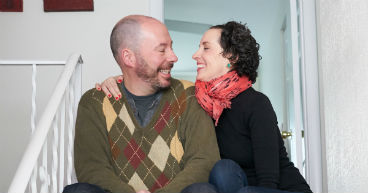
A cancer diagnosis is perhaps the most challenging life event you—and your spouse or partner—may face. Each phase, including early symptoms, diagnosis, treatment and survivorship, has a unique impact on so many aspects of your life, including your relationship with your significant other.
Cancer may change how you perceive yourself or your partner. You may have new and difficult emotions to navigate. You may not yet have the awareness or insight to know just how it will affect your day-to-day life or how to ease the difficulties these complicated changes will have on you.
“Patients will often think very much about their own diagnoses, their own life and forget that they need their partner and that person is going to have their own distress,” says Lynne Thomas, MSW, a counselor at City of Hope® Cancer Center Duarte. “The partner’s distress can be very different from the patient’s distress because so much is out of their partner’s control and they can’t fix it. They don’t know what to say; they don’t know what to do to support their loved one.”
From talking to and counseling countless couples, Thomas and other experts have tips on how to help ensure a relationship doesn’t wither but grows and becomes stronger.
“I’ve had so many couples say that as horrific as cancer is, it’s actually brought out the best in them and it’s brought out the best in their relationship,” Thomas says.
In this article, we’ll explore:
If you’ve been diagnosed with cancer and are interested in learning more about supportive care services offered at City of Hope, including behavioral health counseling and spiritual support, call us or chat online with a member of our team.
Cancer and communication
Communication is the key to unlocking the mutual support that each person in the relationship needs. But understanding the—perhaps new—feelings and emotions and knowing how to effectively communicate them is challenging and always evolving.
“We know that both patient and partner are managing multiple, competing priorities,” Thomas says. “Working; maybe they have kids they’re trying to raise; they need income to pay for treatment; they have aging parents to care for. There’s a lot going on. It really takes a commitment and it takes courage to have that open and honest communication.”
And that may mean sharing difficult emotions like fear, anger, grief, frustration or resentment.
Couples first need to acknowledge that this is not the way either of them wanted their life to go, Thomas says. It’s also important to understand that there are always detours and bumps in life and in any relationship. A strong partnership, however, may act like a good shock absorber.
“A relationship can absorb a lot of ups and downs,” Thomas says.
She suggests acknowledging to each other that cancer “is a huge disruption in our lives, and ask each other how do we get through this together? The couples that approach this as a ‘we’ problem—that is as a team—they just do better. They get through all of the difficult treatment better when they know they’ve got a partner in this.”
That may mean grappling with and expressing uncomfortable feelings and honestly asking for what you need from each other. For instance:
- How to divide chores and responsibilities, which probably will look different than before a diagnosis or treatment and may change over time
- When to offer physical or emotional support and when to back off
- When to have serious talks and when to try to be more light-hearted
Expressing genuine gratitude for the other’s love and for being there even when it’s terribly hard also can be helpful.
A common behavior is called “protective buffering,” Thomas says.
“This occurs between people who love each other, but they avoid talking about certain topics because they don’t want to upset the other person,” she says. “They don’t know what to say or they don’t want to burden the other person with whatever they're worried about.”
The worries and concerns, and even anger and frustration, may be common to both partners, and talking about them may relieve stress and can be cathartic, she says.
Thomas and others counsel couples on ways to broach topics that may be unsettling or scary but are necessary to discuss to strengthen the partnership.
Tips for couples navigating a cancer diagnosis
Below are some ideas and strategies to help couples cope during and after one partner is diagnoses with cancer.
Be involved
As the spouse or partner of someone with cancer, try to stay actively involved by going to appointments with the patient, learning about the cancer, doing research on treatment options and offering the support the patient tells you he or she needs.
Research published in Cancer Medicine in 2022 has shown that patients with involved partners have better outcomes.
Be curious, but respectful
With so many changes and new feelings and emotions, it may be helpful to ask questions of each other at appropriate times. Check in with how the other is feeling and try to be open and honest in communicating with each other.
“Being curious with one another helps to bridge that disconnection that can sometimes happen when the cancer gets between the two partners,” Thomas says.
Give specific reassurances
The best type of reassurance you can give a cancer patient is based on something you can actually do or control, Thomas says.
Well-intentioned platitudes like “you’re going to beat this” or “you’re going to be fine” aren’t actually very reassuring.
“The reassurances that are most helpful are things like ‘I’m going to be here and we’re going to get through this together,’ ” Thomas says. Or “It’s going to be hard, but we’ve got each other.” Or “I’m not going to run away when things get tough.”
Recognize your communication styles
Some people are “tend and befriend” communicators, who may just want to talk about what’s on their mind repeatedly, even if it doesn’t change anything, Thomas says. Others are more “fight/flight” communicators, who want to attack a problem and come up with an action plan.
“Understand that one type of communication isn’t better than the other, they’re just different,” Thomas advises. “Differences can be strength. Each individual—the cancer patient and their partner—are each bringing their own individual strength to the relationship.”
Once you understand each other’s styles, get comfortable expressing what you need from the other person.
For instance, Thomas suggests: “Be specific going into a conversation about what you need. Be able to say, ‘I know this is really hard for you, but I need you to just really listen to me. I don’t need you to fix anything. I don’t need you to minimize anything. I don’t need you to cheer me up; or to be my cheerleader. I just need you to listen to me.’ ”
Emotions, even negative ones, are OK
“It’s ok to be scared. It’s ok to be angry. It’s ok to be uncertain. That doesn’t mean that you’re not being strong; that you’re not being helpful. It means that you’re being human,” Thomas often reminds couples. “This is a scary and uncertain time for everyone.”
Ask for help
Don’t be hesitant to ask others outside of your relationship for help. Even for a supportive couple, managing everything is challenging.
“When you ask for help you’re giving that other person a gift. You’re allowing that person to show that they care about you,” Thomas says.
Remain intimate
When sexual relationships become strained or uncomfortable during cancer treatment, some people may shut down with their partners. But intimacy does not necessarily mean sex. Other areas of intimacy include emotional, intellectual, experiential and spiritual sharing.
Spend time together doing things you both enjoy—go to a movie, discuss a book you’ve both read, play a board game, do a puzzle, attend worship services. Holding hands or sitting quietly together can also feel very intimate and create connection, experts say.
Find others in a similar situation
City of Hope offers a support group for couples navigating cancer. Seek out such groups or other couples who understand what you are going through and can share their experiences. Keep in mind that everyone’s experience is unique.
Another online resource, provided through the American Cancer Society, is the Cancer Survivors Network (CSN), which offers discussion boards and resources for cancer patients.
Encourage independence
As a supportive partner, recognize that your loved one probably wants to feel as independent and in control as possible right now. Allow him/her to decide what he/she can and will do. Encourage your loved one to be as self-sufficient as he/she wants to be. Provide choices whenever possible.
Take a break
It doesn't always have to be about cancer. You and your partner may need a break from cancer every once in a while. Try not to bring up the subject unless your loved one wants to talk about it. Instead, focus on other things, like spending time together doing something fun.
Needs will change
“There are different hits to relationships depending on type of cancer, the longevity of cancer, needs in survivorship,” Thomas notes. “I do think our experience has shown us that cancer can be a catalyst—I hate the word opportunity—to take a look at how you’ve been living and how you and your partner have been conducting your relationship and to start to redefine what your priorities are.”
If you’ve been diagnosed with cancer and are interested in learning more about supportive care services offered at City of Hope, including behavioral health counseling and spiritual support, call us or chat online with a member of our team.


